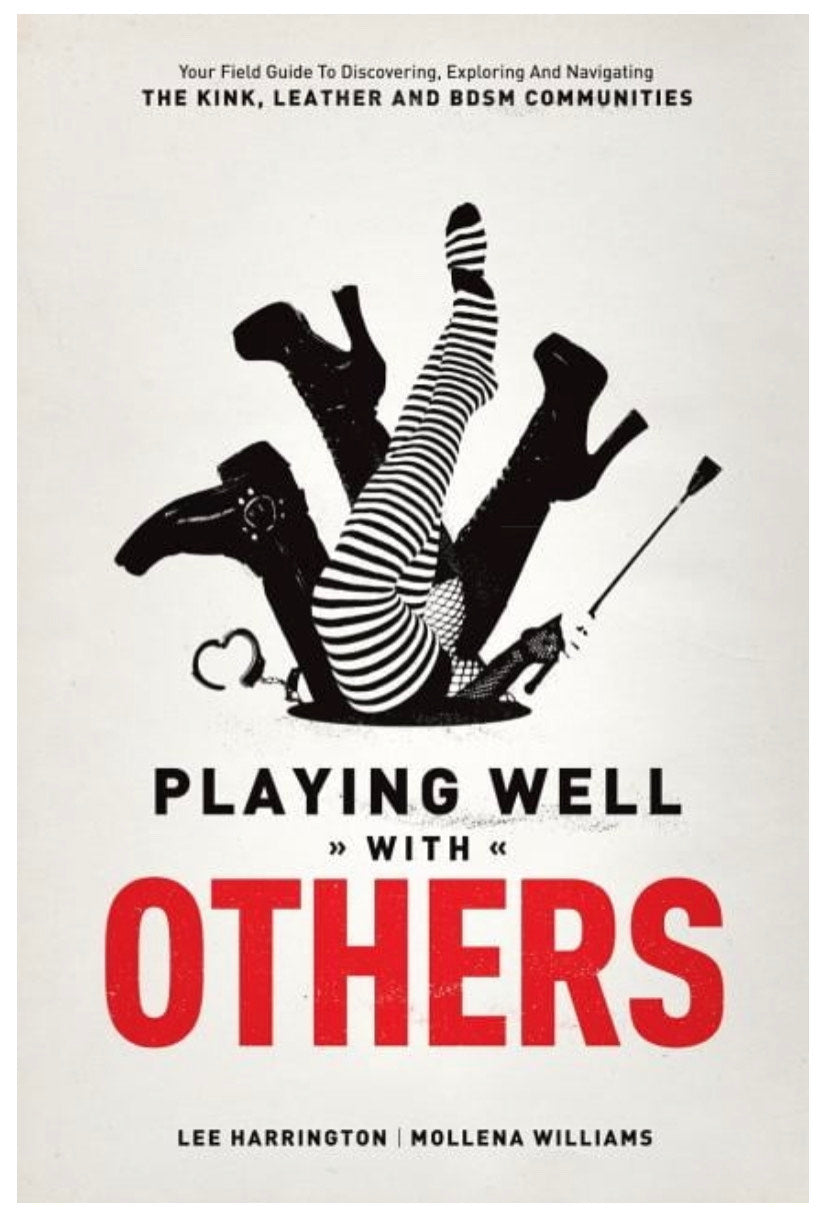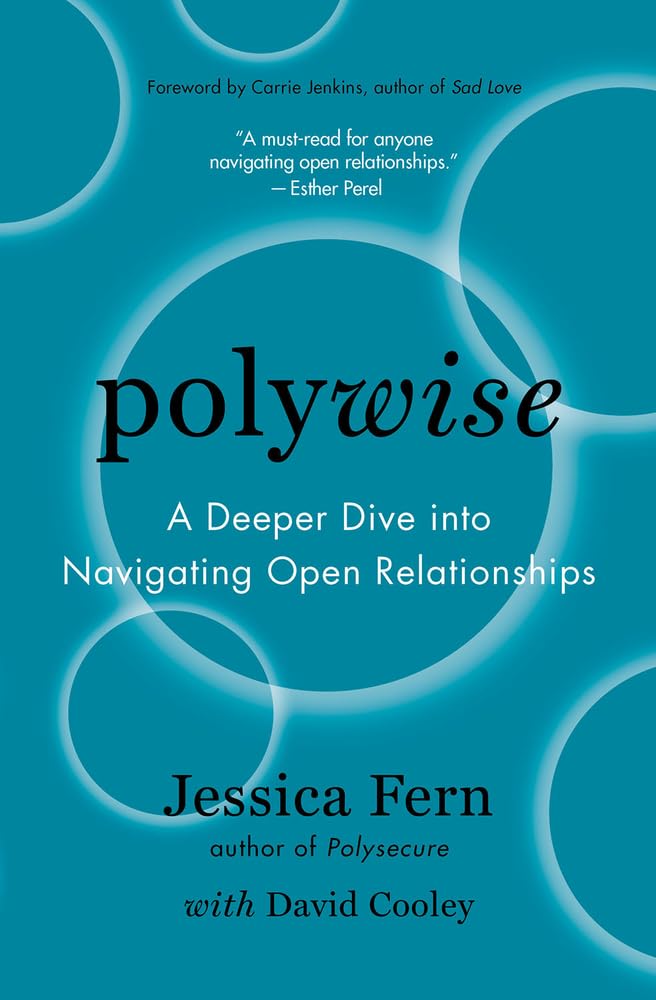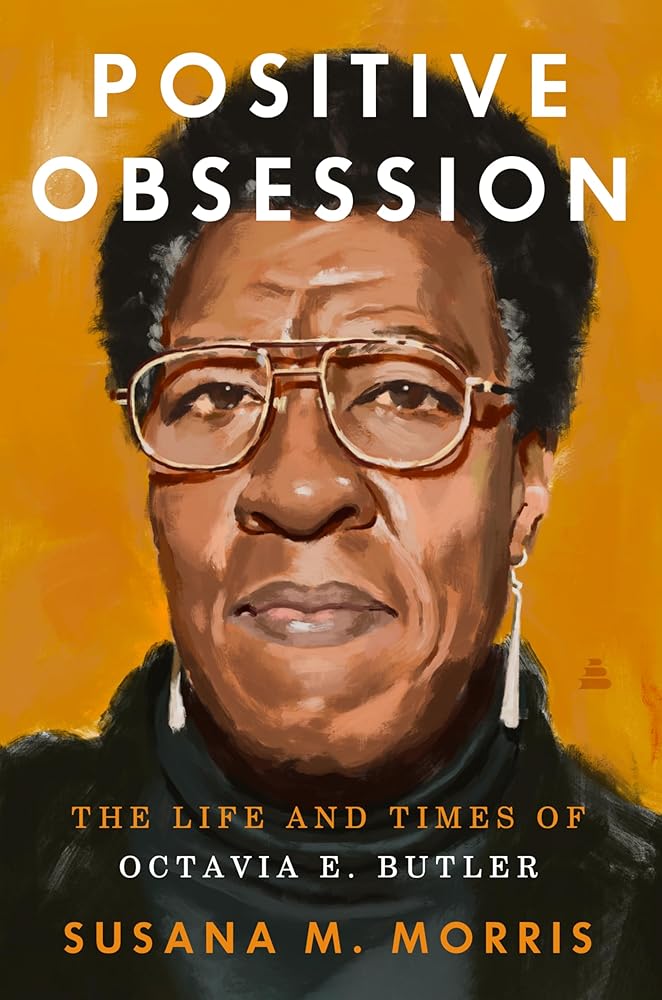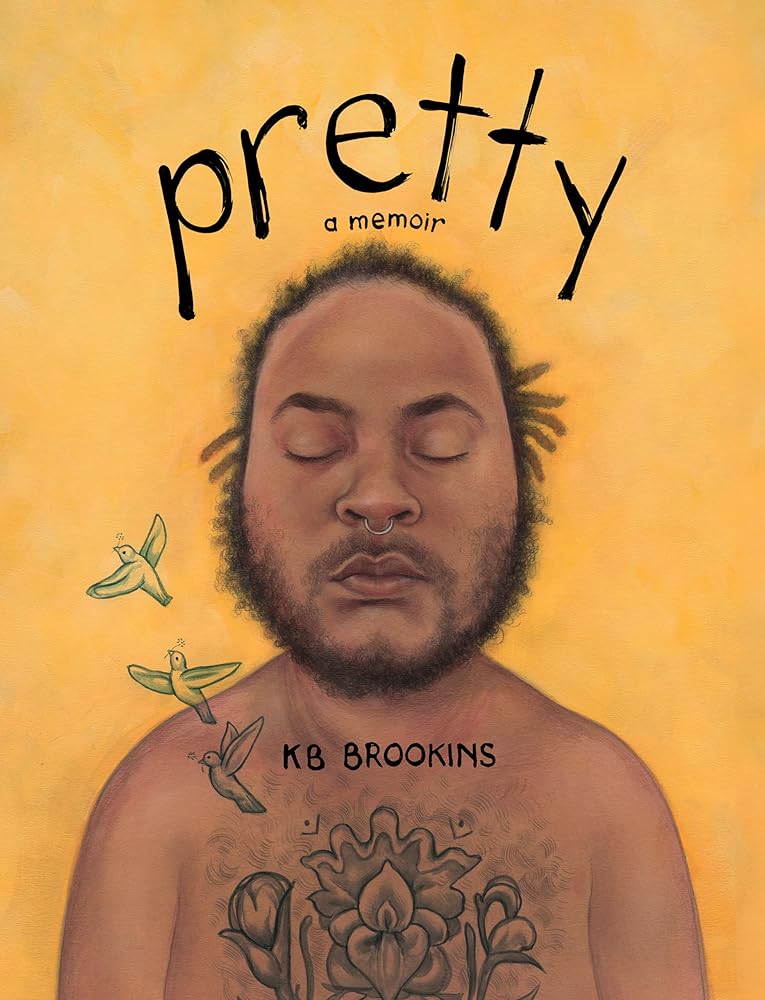Sort by:
2106 products
2106 products
By: Lee Harrington (Author) & Mollena Williams (Author), 2012, Paperback
Whether you're a trembling novice or a jaded expert, there's always something new to be discovered in the endlessly changing, complex and titillating world of kink.
While there are plenty of other books out there that explain how to give a spanking or tie a half-hitch, Playing Well With Others is the first book that explains kink *culture* -- the munches, parties, leather bars, conferences, workshops, fetish nights, exploratoriums and all the other gatherings of kinksters that turn BDSM and leather from a bedroom predilection to a lifestyle and a community.
You'll learn to:
- Examine your own motivations, needs, wants and desires
- Ease your way into established communities
- Understand etiquette in different adventurous sex communities
- Familiarize yourself with the many types of events available to you
- Care for your relationships as you explore new territory
- Negotiate for play and aftercare
- Go back to the "world at large" without ruffling feathers
- ...and, of course, answer the all-important question: What do you wear?!
The team of Harrington and Williams offers 30-plus years of experience in diverse kink communities: top, bottom and switch; gay, bi and straight; female, male and trans; white and POC. Both former titleholders and international educators, they are an unbeatable pair of "sexual sherpas" with an inimitable voice and a great deal of wisdom.
Playing Well With Others is an unprecedented and essential guidebook for anyone who wants to explore or understand the "community" aspect of the kink lifestyle.
The Pocket Guide to LGBTQIA+ Identities features over 40 different sexuality and gender identities, explained in easy to understand language, alongside their respective pride flags. Whether you are part of the LGBTQIA+ community or an ally wanting to learn more, this concise guide is an invaluable resource for everyone who holds the queer community close to their heart.
Details:
- A6 (105 × 148 mm or 4.1 × 5.8 inches)
- 24 pages
- Features over 40 pride flags and identity definitions
By: Jessica Fern (Author), 2023, Paperback
As polyamory continues to make its way into the mainstream, more and more people are exploring consensual nonmonogamy in the hope of experiencing more love, connection, sex, freedom and support. While for many, the move expands personal horizons, for others, the transition can be challenging, leaving them blindsided and overwhelmed. Beyond the initial transition to nonmonogamy, many struggle with the root issues beneath the symptoms of broken agreements, communication challenges, increased fighting and persistent jealousy. Polyamorous psychotherapist Jessica Fern and restorative justice facilitator David Cooley share the insights they have gained through thousands of hours working with clients in consensually nonmonogamous relationships. Using a grounded theory approach, they explore the underlying challenges that nonmonogamous individuals and partners can experience after their first steps, offering practical strategies for transforming them into opportunities for new levels of clarity and intimacy. Polywise provides both the conceptual framework to better understand the shift from monogamy to nonmonogamy and the tools to navigate the next steps.
By Debbie Urbanski: Paperback; 320 pages / English[Simon & Schuster]
If you could go anywhere, where would you go? And what happens to the people you leave behind? From the author of After World comes a genre-busting collection of stories that reveal our lives in a startling new light, perfect for fans of Kelly Link and Carmen Maria Machado In Portalmania, Debbie Urbanski wields sci-fi, fantasy, horror, and realism to build a dark mirror that she holds up to the ordinary world. Within the sharply imagined landscape of this collection, portals appear in linen closets, planetary gateways materialize in boarding schools, monsters wait in bathroom vents, and transformations of women’s bodies are an everyday occurrence. Political division causes physical rifts that break apart the Earth’s crust. A son on another planet sends dispatches home to the mother who failed him, and a wife turns to the supernatural to escape her abusive marriage.
A magnificent cultural biography that charts the life of one of our greatest writers, situating her alongside the key historical and social moments that shaped her work.
As the first Black woman to consistently write and publish in the field of science fiction, Octavia Butler was a trailblazer. With her deft pen, she created stories speculating the devolution of the American empire, using it as an apt metaphor for the best and worst of humanity—our innovation and ingenuity, our naked greed and ambition, our propensity for violence and hierarchy. Her fiction charts the rise and fall of the American project—the nation’s transformation from a provincial backwater to a capitalist juggernaut—made possible by chattel slavery—to a bloated imperialist superpower on the verge of implosion.
In this outstanding work, Susana M. Morris places Butler’s story firmly within the cultural, social, and historical context that shaped her life: the Civil Rights Movement, Black Power, women’s liberation, queer rights, Reaganomics. Morris reveals how these influences profoundly impacted Butler’s personal and intellectual trajectory and shaped the ideas central to her writing. Her cautionary tales warn us about succumbing to fascism, gender-based violence, and climate chaos while offering alternate paradigms to religion, family, and understanding our relationships to ourselves. Butler envisioned futures with Black women at the center, raising our awareness of how those who are often dismissed have the knowledge to shift the landscape of our world. But her characters are no magical martyrs, they are tough, flawed, intelligent, and complicated, a reflection of Butler’s stories.
Morris explains what drove Butler: She wrote because she felt she must. “Who was I anyway? Why should anyone pay attention to what I had to say? Did I have anything to say? I was writing science fiction and fantasy, for God’s sake. At that time nearly all professional science-fiction writers were white men. As much as I loved science fiction and fantasy, what was I doing? Well, whatever it was, I couldn’t stop. Positive obsession is about not being able to stop just because you’re afraid and full of doubts. Positive obsession is dangerous. It’s about not being able to stop at all.”
Published by Microcosm! Paperback book / coloring book. The Post-Structuralist Vulva Coloring Book demystifies gender and interrogates your assumptions as you are drawn into its mesmerizing patterns, folds, and whorls. By overwhelming the senses with vulvas, you can easily deconstruct the meaning and very existence of this social construct we call the "vulva" and the instructions for living that come with it. Quotations from post-structuralist philosophers accompany the art. Tear-out pages.
Set loose a herd of bison in downtown Edmonton: what could go wrong?
Métis cousins Isidore “Ezzy” Desjarlais and Grey Ginther have beef with their world. With the latest racist policy rolling out. With whatever new pipeline plowing through traditional territory. With the way a treaty (aka, the army) forced the Papaschase Cree off their home on the prairie. And, on the other hand, with how Grey’s friends think if they all just went back to the Rez or the settlement, life would be so much better—pretty, like an Instagram ad. Then there’s the warming planet. And their future, which they seem to be screwing up quite well on their own. Being alive can’t be all cribbage, Lucky Lager, and swiping the occasional catalytic converter.
One night, the cousins hatch a plan to capture a herd of bison from a nearby national park and release them in downtown Edmonton. They want to be seen, be heard, and to disrupt the settler routines of the city, yet they have no idea what awaits them or the fateful consequences their actions have. Balancing wit and sorrow in a work of satire, social commentary, and whip-smart storytelling, Prairie Edge follows Ezzy and Grey’s inspired misadventures as their zealous ideas about bringing about real change do indeed elicit change, just in unexpected and sometimes disastrous ways.
Conor Kerr imagines a web of Métis relationships strained by dislocation, poverty, violence, and cultural drift, but he also laces the ties that bind Ezzy and Grey—and forever bind the Métis to the land—to explore the radical possibility that a couple of inspired miscreants might actually have the power to make a difference.
#1 NEW YORK TIMES BESTSELLER • Rachel Maddow traces the fight to preserve American democracy back to World War II, when a handful of committed public servants and brave private citizens thwarted far-right plotters trying to steer our nation toward an alliance with the Nazis.
“A ripping read—well rendered, fast-paced and delivered with the same punch and assurance that she brings to a broadcast. . . . The parallels to the present day are strong, even startling.”—The New York Times (Editors’ Choice)
Inspired by her research for the hit podcast Ultra, Rachel Maddow charts the rise of a wild American strain of authoritarianism that has been alive on the far-right edge of our politics for the better part of a century. Before and even after our troops had begun fighting abroad in World War II, a clandestine network flooded the country with disinformation aimed at sapping the strength of the U.S. war effort and persuading Americans that our natural alliance was with the Axis, not against it. It was a sophisticated and shockingly well-funded campaign to undermine democratic institutions, promote antisemitism, and destroy citizens’ confidence in their elected leaders, with the ultimate goal of overthrowing the U.S. government and installing authoritarian rule.
That effort worked—tongue and groove—alongside an ultra-right paramilitary movement that stockpiled bombs and weapons and trained for mass murder and violent insurrection.
At the same time, a handful of extraordinary activists and journalists were tracking the scheme, exposing it even as it was unfolding. In 1941 the U.S. Department of Justice finally made a frontal attack, identifying the key plotters, finding their backers, and prosecuting dozens in federal court.
None of it went as planned.
While the scheme has been remembered in history—if at all—as the work of fringe players, in reality it involved a large number of some of the country’s most influential elected officials. Their interference in law enforcement efforts against the plot is a dark story of the rule of law bending and then breaking under the weight of political intimidation.
That failure of the legal system had consequences. The tentacles of that unslain beast have reached forward into our history for decades. But the heroic efforts of the activists, journalists, prosecutors, and regular citizens who sought to expose the insurrectionists also make for a deeply resonant, deeply relevant tale in our own disquieting times.
Get lost in stories of ties and whips, bite marks and bruises, a primal chase, femme bottom desire for their butch tops, and delicious acts of queer rebellion. This kinky compilation of femme/enby/butch flash fiction, featuring lots of dom/sub encounters, celebrates the liberating power of BDSM and the whole spectrum of femme bisexual ecstasy. Some of these stories may push boundaries, so choose your safe word before partaking in their pleasures.
By a prize-winning, young Black trans writer of outsized talent, a fierce and disciplined memoir about queerness, masculinity, and race.
Even as it shines light on the beauty and toxicity of Black masculinity from a transgender perspective—the tropes, the presumptions—Pretty is as much a powerful and tender love letter as it is a call for change.
“I should be able to define myself, but I am not. Not by any governmental or cultural body,” Brookins writes. “Every day, I negotiate the space between who I am, how I’m perceived, and what I need to unlearn. People have assumed things about me, and I can’t change that. Every day, I am assumed to be a Black American man, though my ID says ‘female,’ and my heart says neither of the sort. What does it mean—to be a girl-turned-man when you’re something else entirely?”
Informed by KB Brookins’s personal experiences growing up in Texas, those of other Black transgender masculine people, Black queer studies, and cultural criticism, Pretty is concerned with the marginalization suffered by a unique American constituency—whose condition is a world apart from that of cisgender, non-Black, and non-masculine people. Here is a memoir (a bildungsroman of sorts) about coming to terms with instantly and always being perceived as “other”


















